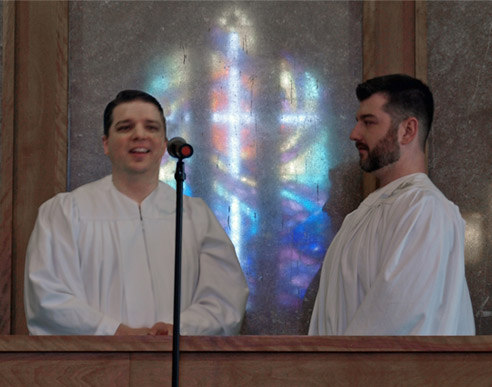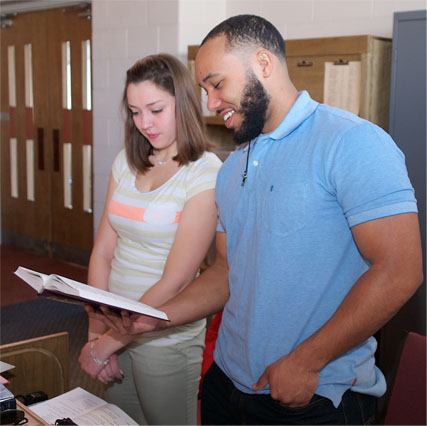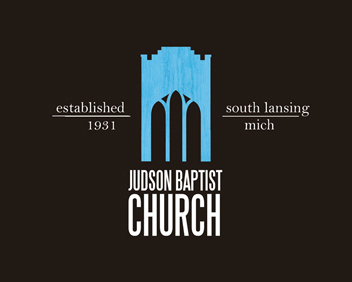|
WHAT WE BELIEVE
At Judson Baptist Church, we confess orthodox Christian doctrine and affirm the historic Baptist faith. First and foremost, we hold to the ancient creeds of the Christian Church, which all Christian believers hold in common.
This means we believe in the Trinity—three Persons (Father, Son, and Holy Spirit) in one God.
We believe that God created all that exists and that it was good. Then sin entered the picture, bringing a curse on mankind and all of creation, shattering the shalom (peace and harmony) that God created and fixing an impassible chasm between us and God.
 To restore that shalom and bring us back into a relationship of blessing with our Creator, God the Son came and dwelt amongst us. He was conceived by the Holy Spirit and became a man, born miraculously of a virgin named Mary. Fully God and fully man, Jesus Christ walked with us, embodying God’s holiness and His love, preaching, healing, and comforting, while challenging the religious system of his day. Then, to pay our sin debt and bring us salvation, he died on a cross as our Substitute. Christ was buried in a tomb and, on the third day, rose again from the dead. After appearing to many, he ascended to the right hand of the Father. To restore that shalom and bring us back into a relationship of blessing with our Creator, God the Son came and dwelt amongst us. He was conceived by the Holy Spirit and became a man, born miraculously of a virgin named Mary. Fully God and fully man, Jesus Christ walked with us, embodying God’s holiness and His love, preaching, healing, and comforting, while challenging the religious system of his day. Then, to pay our sin debt and bring us salvation, he died on a cross as our Substitute. Christ was buried in a tomb and, on the third day, rose again from the dead. After appearing to many, he ascended to the right hand of the Father.
We believe that Jesus Christ will come again to judge the living and the dead and that his Kingdom will have no end. In the meantime, all who have repented of their sins and believed in Jesus are free from the condemnation of sin, filled with the Holy Spirit, called to a life of holiness, and sent out to proclaim the good news of Jesus Christ and show the love of God to a lost and dying world.
To help and empower us for this, we have 1. the Holy Spirit—the third person of the Blessed Trinity—indwelling us, to guide, equip, comfort, and convict; 2. Christ's Church, to hold us up, spiritually feed us, direct us, and encourage us; and 3. God’s Holy Word, full of promises, instruction, teaching, and hope.
In addition to these core doctrines, we hold to a number of particular beliefs as Baptists.
One major difference between Baptists and most other Christian traditions is that we believe in the self-governance of local churches. Because we see the local congregation as the primary biblical expression of the Church, no individual or body (bishop, synod, diocese, etc.) has hierarchical authority to dictate doctrine or practice to our churches. Baptist churches do organize themselves into associations for joint mission work, worship, fellowship, etc., but rather than a “top-down” approach in which the denomination’s governing body is above the local congregation, Baptists effect a “bottom-up” approach, in which the churches empower the denomination or association to do ministry on their collective behalf.
This “bottom-up” understanding of Jesus’ ministry and the Scriptures’ teaching about the Church continues into how we view the individual believer's position and responsibilities within the church. Rather than “going through” a human priest or intermediary to approach God, we believe in the Reformation principle of the priesthood of all believers. Each Christian can come directly to their Creator, through the ministry of the one High Priest, Jesus Christ.
 Related to this is the concept of soul liberty or liberty of conscience, meaning that each person is responsible before God for his or her own beliefs, convictions, and interpretation of Scripture. As a result, churches that embrace the historic Baptist faith will contain many diverse views about secondary matters of faith without insisting on uniformity. This was a central tenant for the earliest Baptists in the 1600s, because they were persecuted, first in England and then in America, for refusing to conform to Anglican or Puritan dogma and practices. This is also why the separation of church and state is usually listed as a Baptist distinctive. While this concept is assumed in many churches today, it was relatively unheard of when our Baptist forbears first insisted that matters of religious conscience should be outside the domain of the magistrate's authority. Related to this is the concept of soul liberty or liberty of conscience, meaning that each person is responsible before God for his or her own beliefs, convictions, and interpretation of Scripture. As a result, churches that embrace the historic Baptist faith will contain many diverse views about secondary matters of faith without insisting on uniformity. This was a central tenant for the earliest Baptists in the 1600s, because they were persecuted, first in England and then in America, for refusing to conform to Anglican or Puritan dogma and practices. This is also why the separation of church and state is usually listed as a Baptist distinctive. While this concept is assumed in many churches today, it was relatively unheard of when our Baptist forbears first insisted that matters of religious conscience should be outside the domain of the magistrate's authority.
Many people presuppose that, because of our name, baptism is the most important aspect of Baptist theology. While that is not the case, our understanding of baptism—that it is an ordinance of our Lord, which should only be administered to believers—is quite important to us. Keeping with the concept of soul liberty, we do not baptize on the basis of what an individual’s parents believe, but based on the professed and demonstrated faith of the individual him or herself. We further understand immersion (rather than sprinkling or pouring) to be the most biblical method for baptism, in that it best fits the biblical teaching.
Finally, because of our “bottom-up” approach, our churches are comprised of baptized, regenerate believers, who are together led by the Holy Spirit and who call and empower deacons, elders, and pastors to lead and equip them for ministry.
| |






 To restore that shalom and bring us back into a relationship of blessing with our Creator, God the Son came and dwelt amongst us. He was conceived by the Holy Spirit and became a man, born miraculously of a virgin named Mary. Fully God and fully man, Jesus Christ walked with us, embodying God’s holiness and His love, preaching, healing, and comforting, while challenging the religious system of his day. Then, to pay our sin debt and bring us salvation, he died on a cross as our Substitute. Christ was buried in a tomb and, on the third day, rose again from the dead. After appearing to many, he ascended to the right hand of the Father.
To restore that shalom and bring us back into a relationship of blessing with our Creator, God the Son came and dwelt amongst us. He was conceived by the Holy Spirit and became a man, born miraculously of a virgin named Mary. Fully God and fully man, Jesus Christ walked with us, embodying God’s holiness and His love, preaching, healing, and comforting, while challenging the religious system of his day. Then, to pay our sin debt and bring us salvation, he died on a cross as our Substitute. Christ was buried in a tomb and, on the third day, rose again from the dead. After appearing to many, he ascended to the right hand of the Father.
 Related to this is the concept of soul liberty or liberty of conscience, meaning that each person is responsible before God for his or her own beliefs, convictions, and interpretation of Scripture. As a result, churches that embrace the historic Baptist faith will contain many diverse views about secondary matters of faith without insisting on uniformity. This was a central tenant for the earliest Baptists in the 1600s, because they were persecuted, first in England and then in America, for refusing to conform to Anglican or Puritan dogma and practices. This is also why the separation of church and state is usually listed as a Baptist distinctive. While this concept is assumed in many churches today, it was relatively unheard of when our Baptist forbears first insisted that matters of religious conscience should be outside the domain of the magistrate's authority.
Related to this is the concept of soul liberty or liberty of conscience, meaning that each person is responsible before God for his or her own beliefs, convictions, and interpretation of Scripture. As a result, churches that embrace the historic Baptist faith will contain many diverse views about secondary matters of faith without insisting on uniformity. This was a central tenant for the earliest Baptists in the 1600s, because they were persecuted, first in England and then in America, for refusing to conform to Anglican or Puritan dogma and practices. This is also why the separation of church and state is usually listed as a Baptist distinctive. While this concept is assumed in many churches today, it was relatively unheard of when our Baptist forbears first insisted that matters of religious conscience should be outside the domain of the magistrate's authority.